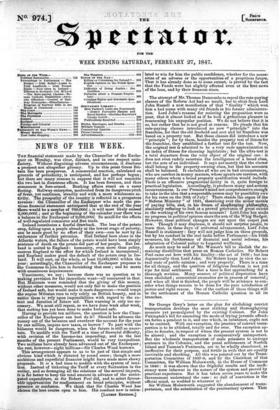The attempt of Mr. Thomas Duncombe to repeal the rate-paying
clauses of the Reform Act had no result, but to elicit from Lord John Russell a new manifestion of that " finality " which won him a bad name with many old friends in his former administra- tion. Lord John's reasons for resisting the proposition were so poor, that it almost looked as if he took a gratuitous pleasure in reassuming his unpopular position. We do not believe that it is so, but rather that he is not good at reasons. He pleads that his rate-paying clauses introduced no new "principle" into the franchise, for that the old freehold and scot and lot franchise was based on a property test. But those clauses did introduce a new "principle"; for by them, besides the property test of fitness for the franchise, they established a further test for the test. Now, the original test is admitted to be a very rude approximation to an index of fitness for choosing legislators ; but the ultra-test is a total departure from the very object of the original one : it does not even rudely ascertain the intelligence of a broad class, but the acts of an individual. It says not merely that the elector shall belong to the property-owning class, but that his accounts shall be balanced. It excludes all who are in bad circumstances, who are careless in money matters, whose agents are careless, with many others whom a broad property qualification would include. There is an offensive pragmatical nicety in it, quite foreign to
practical legislation. Accordingly, serious
it produces many and seous inconveniences. Is our Premier's mind not comprehensive enough to take in the idea that a respectable person may by possibility owe for his rates on the 20th of July? There stands the organ of the "Reform Ministry" of 1831, theorizing over the minor morals of paying bins, and, in his dream of shopkeeping philosophy, absolutely refusing to look at a proved grievance of great extent in the working of his own famous measure! Lord John has made no progress in political opinion since the tem of the Whig Budget. However, these political changes are not upon the carpet just now. Though it may displease, it should not surprise people, to learn that, in these days of universal advancement, Lord John Russell is stationary : they will not judge him on those grounds, but by his conduct in the real tasks before Parliament—his Irish measures, his furtherance of financial and social reforms, his adaptation of Colonial policy to Imperial wellbeine.. As much may be said of Mr. Watson's bill to aolish the re- maining disabilities that press on Roman Catholics. Sir Robert Peel came out here with his finality—the act of 1829; but less dogmatically than Lord John. Sir Robert keeps in view the ac- tual state of public opinion ; and very properly. There is a time for all things, and the question of religious freedom is not yet ripe for final settlement. But a time is fast approaching for a thorough revision. Many sources of political disputation have been abolished ; economical anomalies are in process of removal ; and when all that is finished, the people will be at leisure to con- sider what things remain to be done for the pure satisfaction of justice and right reason. One of the earliest of those things will be the settlement of the Roman Catholic question in all its branches.


























